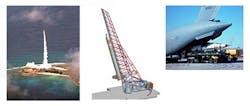Aerojet Rocketdyne tests rocket motor for Low Earth Orbiting Nanosatellite Integrated Defense Autonomous System
SACRAMENTO, Calif., 14 Aug. 2014. Aerojet Rocketdyne’s Low Earth Orbiting Nanosatellite Integrated Defense Autonomous System (LEONIDAS) first-stage, solid-propellant rocket motor (LEO-46) has completed a hot-fire static test at the Air Force Research Laboratory (AFRL) at Edwards Air Force Base in California.
Aerojet Rocketdyne monitored the full-scale, full-duration firing of the 52-inch diameter by 40-foot long motor as it generated nearly 300,000-lbf of thrust during the 73-second test. LEO-46 is the first stage of a three-stage propulsion system developed for the Super Strypi rail-launched, spin stabilized launch vehicle.
The unique design of the solid rocket motors (SRM), combined with the simplicity of the launch vehicle architecture, enables low cost space access for small satellite packages up to 250 kg to 300 kg. The LEO-46 firing completes the series of three successful LEO motor ground test demonstrations. The LEO-7 second stage motor and the LEO-1 third stage motor were tested in August 2012 and September 2013, respectively.
"This final LEO hot-fire test highlights the success of our robust, affordable large motor development efforts," describes Tyler Evans, Aerojet Rocketdyne vice president of the Rocket Shop(SM) Defense Advanced Programs. "With the advent of the LEO family of motors, along with our recent large class (92") second stage static tests, Aerojet Rocketdyne is an industry leader in newly developed large solid rocket motors."
Aerojet Rocketdyne will complete final build-up of a flight motor set this year to support the ORS-4 launch mission. Sponsored by the Operationally Responsive Space Office in partnership with Sandia National Laboratories, the University of Hawaii/Hawaii Space Flight Laboratory, the Pacific Missile Range Facility, and Aerojet Rocketdyne, the ORS-4 mission will launch out of Kauai, Hawaii. The maiden flight will represent the largest propulsion system ever launched from a rail system.
"The LEO motors and their variants will serve applications in small launch vehicles, target vehicles and national defense architectures,"
says Paul Meyer, Aerojet Rocketdyne senior vice president, Advanced Programs and Business Development. "This tremendous effort was accomplished in our Rocket Shop(SM) by a small team of dedicated personnel working closely with colleagues in industry, academia and government agencies. I am very excited about the upcoming Super Strypi flight test and the future educational, commercial and national security benefits achieved with this new launch vehicle."
Aerojet Rocketdyne is a GenCorp (NYSE:GY) company providing propulsion and energetics to the space, missile defense and strategic systems, tactical systems, and armaments areas, in support of domestic and international markets.

Courtney E. Howard | Chief Editor, Intelligent Aerospace
Courtney enjoys writing about all things high-tech in PennWell’s burgeoning Aerospace and Defense Group, which encompasses Intelligent Aerospace and Military & Aerospace Electronics. She’s also a self-proclaimed social-media maven, mil-aero nerd, and avid avionics and space geek. Connect with Courtney at [email protected], @coho on Twitter, on LinkedIn, and on Google+.


